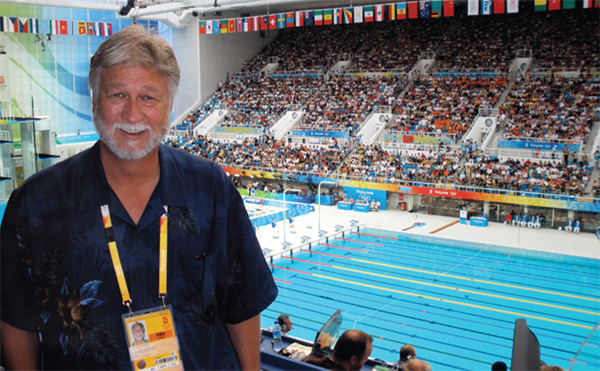 “Have you seen beach volleyball?” asks Doug Wren (’73). “It’s incredible. It’s nutty — unlike any other Olympic sport. There’s a DJ and cheerleaders. It’s like a big party.”
“Have you seen beach volleyball?” asks Doug Wren (’73). “It’s incredible. It’s nutty — unlike any other Olympic sport. There’s a DJ and cheerleaders. It’s like a big party.”
Wren has a VIP pass to that party this summer when he directs the live world feed of beach volleyball at the Olympic Games in London. This will be the eighth games for Wren, who majored in radio/television/film. He has produced or directed live feeds for the Olympics since 1992, including diving in Barcelona, swimming in Atlanta, whitewater rafting in Sydney, speed skating in Salt Lake City and basketball — “all 96 games!” — in Beijing.
NBC will pick up the live coverage of beach volleyball July 28-Aug. 9 at Horse Guards Park, across the street from Buckingham Palace.
“I hope I’ll be able to show the changing of the guards at the same time we’re playing volleyball,” says Wren, who will be several yards away directing the world feed from inside a television truck. “It will be the most unique venue of the Games.”
Wren says he learned the fundamentals of directing at North Texas from Ed Glick.
“Prior to class with Glick, I had the same view of television as everyone else,” Wren says. “I wanted to be an announcer because that’s all anyone can identify with.”
Wren read the news on KNTU. Then he took a production class with Glick, where he learned to direct.
“I realized that interested me a whole lot more,” Wren says.
Split-second decisions
As director, Wren works with a producer and a crew to coordinate the live television coverage. They work from a television truck and watch feeds from several cameras on the field.
“Any time there’s a shot change,” Wren says, “that came from a director. Everything is a split-second decision when you’re cutting cameras. You have to anticipate what’s going to happen.”
After graduation, Wren worked production jobs at television stations across the country, gaining experience putting commercials on the air and directing sports coverage either out of remote trucks or classrooms using a microwave signal.
In 1982, he and a group of friends created Winner Communications. They started by producing quarter horse racing and Thoroughbred racing for major networks, including the newly founded ESPN. After 25 years, Winner Communications became the largest producer of programming on ESPN. The company was sold six years ago.
Adrenalin rush
Wren also has freelanced for various networks throughout his career, including the International Olympic Committee. He’s often hired years in advance.
“There’s nothing like being at the Olympics,” he says. “It’s one of the pinnacles of sports television.”
Wren will spend three weeks in London working 10- to 12-hour days six days a week. He’ll return to London a few weeks later to direct wheelchair basketball at the Paralympics.
This is Wren’s first time directing beach volleyball, although he watched it live at the Sydney Olympics. He spent the past year studying the game, figuring the field of play and the best camera angles.
“It’s like making a movie,” says Wren. “Now that I’m directing the live feed, I get to pick the crew.”
For volleyball, that means a huge staff of 50 or 60 people — including at least a dozen camera people.
“I bring them in from all around the country. I’ll be working with friends,” he says.
Wren hopes to get some time off so he can watch swimming. He swam competitively in high school and knew swimmers who eventually went to the Olympics.
“For me, directing a live feed is like an extension of being an athlete. It gives you that same adrenalin rush that you get when you’re participating in sports,” he says. ”It’s really exciting to be a part of the game.”


